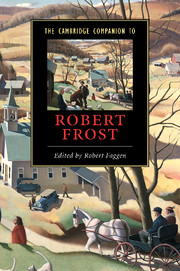Book contents
- Frontmatter
- Introduction
- 1 “Stay Unassuming”
- 2 Frost Biography and A Witness Tree
- 3 Frost and the Questions of Pastoral
- 4 Frost and the Ancient Muses
- 5 Frost as a New England Poet
- 6 “Across Spaces of the Footed Line”
- 7 Frost’s Poetry of Metaphor
- 8 Frost and the Meditative Lyric
- 9 Frost’s Poetics of Control
- 10 Frost’s Politics and the Cold War
- 11 “Synonymous with Kept”
- 12 Human Presence in Frost’s Universe
- Select bibliography
- Index
Introduction
Published online by Cambridge University Press: 28 May 2006
- Frontmatter
- Introduction
- 1 “Stay Unassuming”
- 2 Frost Biography and A Witness Tree
- 3 Frost and the Questions of Pastoral
- 4 Frost and the Ancient Muses
- 5 Frost as a New England Poet
- 6 “Across Spaces of the Footed Line”
- 7 Frost’s Poetry of Metaphor
- 8 Frost and the Meditative Lyric
- 9 Frost’s Poetics of Control
- 10 Frost’s Politics and the Cold War
- 11 “Synonymous with Kept”
- 12 Human Presence in Frost’s Universe
- Select bibliography
- Index
Summary
If there is any truth to Emerson's aphorism “to be great is to be misunderstood,” then Robert Frost is surely one of the greatest poets. In a century in which some of the most celebrated literature seemed to follow Emerson in reverse - “to be misunderstood (or incomprehensible) is to be great” - Robert Frost's seductively limpid lines were taken as evidence of the author's simplicity or, worse, simplemindedness. Frost's popularity, as well as his willingness in his later years to perform as a hoary public sage, left many among the academically sophisticated suspicious. His adherence to ancient literary traditions and his disdain of political radicalism angered those with more revolutionary temperaments. A reviewer, commenting in The New Yorker on his Collected Poems of 1930, proclaimed that his “popularity can be put down to the fact that he always expressed with imaginative sincerity, American nostalgia for a lately abandoned rural background,” and that he was a bard “always occupied with the complicated task of simply being sincere.”
- Type
- Chapter
- Information
- The Cambridge Companion to Robert Frost , pp. 1 - 6Publisher: Cambridge University PressPrint publication year: 2001
- 1
- Cited by



